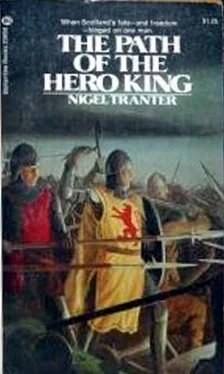Almost speechless, Robert Bruce shook his head.
Dear God, he muttered, I would not… I would not have believed it.
The folly of it!
They have little choice, Douglas said.
And is it so ill a choice? It will be uncomfortable, yes. But there is water for all their horse, at least. And the men, though scattered, are safe there from any night assault from us. Their flanks protected by the burn and the Forth …
Bruce stared at him with a strange look in his narrowed eyes.
You think so? Pray God, then, that they stay there! Pray God, I say!
And now-call me a council. We shall eat while we have it.
Every commander here to this knoll…
Chapter Twenty-one
There was little of darkness that June night, and little sleep in it for Robert Bruce at least. Despite the pleas of his friends that he should rest, much of it he passed in restless pacing, anxious eyes ever turned eastwards, down to where the myriad fires of the English host pinpointed the dusk and made the floor of the Carse like the reflection of a star-strewn sky.
The King was, for that stark period, a prey to doubts and dreads.
He was that, indeed, a deal more often than even his closest colleagues knew, and always had been. In a few hours he might well be dead, along with so many others. But it was not that thought which unmanned him, but the fear that what he had fought for so terribly for seventeen long years might well be thrown away in one brief day. All along, he had had that dread, and so had resolutely refused to hazard his all in any great fixed battle. That evening, during the council-of-war, he could have been persuaded, even yet, to give up all and withdraw, under cover of night, far to the west, to Lennox perhaps, as that Earl had suggested, and the skirts of the Highland hills, where no English army could follow, so that at least total disaster was avoided. He had been tired, of course, as he was tired now-yet could not rest.
Oddly, almost as strong a fear in his mind was of a reverse sort.
Fear that the English would perceive how dangerous was their present position, and move out of it, to the attack, before he could take advantage of their mistake. Attack-there was the crux of the matter. The enemy position in that marshland was fair enough as a resting place, if inconveniently waterlogged. At least it could not be outflanked. It was only a trap if the host had to fight therein, an armoured and horsed host. It was no place for fighting, and undoubtedly the English had only gone there to bivouac. But if they could be brought to battle there …! Which meant attack, early attack. By the Scots. But only if the Scots left their strong defensive positions, with their clear line of retreat westwards. Only thus could the potentialities of the cars eland be exploited. Was this folly upon folly?
So Bruce paced the dew-drenched turf of his green knoll, and fought in
his mind and spirit and with his own Battle of Bannockburn that night
Yet, at the back of it all, he knew what he was going to do, and his
greatest fear was that the enemy would be aroused and on the move, out of the trap, before he could spring it When he could restrain himself no longer, soon after three oclock of the Monday morning, the King had all others roused from their rest-but quietly and not by any blowing of bugle. Then, in the dove-grey, pre-sunrise light, Maurice, Abbot of Inchaffray, celebrated High Mass before the coughing, yawning shadowy host, and, aided by the other clergy, great and small, went round the serried ranks with the Sacrament.
As, thereafter, they all partook of a more material but still austere refreshment, Bruce addressed them sternly, but confidently, swallowing his own fears, telling them what he, and Scotland, expected of them this day, the birthday of John the Baptist, and of how it was to be achieved-with the help of the said saint, also Saint Andrew of Scotland and the martyr Saint Thomas. And not least, their own abiding belief in freedom. Where he led them today there could be no turning back, for him or for any. Holy Church had blessed them. And the Chancellor, the Abbot Bernard, would carry the sacred Brecbennoch of Saint Columba before them in the fray. As would the Dewar of the Main carry Saint Fillans arm-bone. For himself, he here and now proclaimed full pardon for all and every offence committed against the Crown to all who fought that day, and relief from every tax or duty of any who fell in the battle. Let the victories of the day before hearten them but also let them remember that today the veterans Pembroke and Ulster were with King Edward, and they must look for firmer command. Therefore, the Scots would strike first-and God be with them, and surprise likewise!
With a minimum of noise, no shouting or trumpeting, the Scots army then marshalled itself into its four great divisions under the same commanders as before-only this time, all the cavalry was put under the command of Sir Robert Keith the Marischal, to take the extreme left wing, nearest Stirling; and the non-fighting clergy, with the porters, grooms and other non-combatants, sent, with the baggage and packhorses, to a green ridge north of St. Ninians, where they might watch and wait.
With the sunrise just beginning to stain the eastern sky in their faces, the silent advance commenced.
They gradually moved into line abreast, Edward Bruces division this time in the place of honour on the extreme right, and very slightly ahead; then Moray; the Douglas and Walter the Steward; then the King with the largest number, including the Islesmen under Angus Og. Keith and the cavalry, farther left still, held back meantime. Bruce, only chain-mail again under his vivid surcoat, in arched with the rest, Irvine leading his grey pony.
Where he was going was no place for chargers-as he hoped he might have opportunity to prove to Edward of Carnarvon.
At every pace of the misty, mile-long, downhill march, the King listened with ears stretched for the sound he dreaded-English bugles blowing-and heard none.
At length, on the very lip of the Carse, the light growing and the night mists dispersing, the English outposts became aware of the untimely and outrageous Scots advance, and everywhere trumpets began to shrill.
I swear King Edward must have had a better night than I!
Bruce commented to Angus Og, feeling better already with the prospect of action at last.
Now, let us give him a busy day!
When Bruce had told his own trumpeter to make the first, short flourish of the day, he stepped forward, with Abbot Bernard and the Brecbennoch reliquary, a little in front, and sank to his knees.
And behind him, while fiercest excitement and bustle, not to say panic, seethed in the roused and far-scattered English camp, the Scots ranks knelt in their thousands, and a ragged but heartfelt rendering of the Lords Prayer rose amongst the shouting larks above the Carse of Stirling.
Your prince is become much concerned with God, these days.
For an excommunicate! the Lord of the Isles murmured, to Lennox, as the droning prayer ascended.
Is it for his own soul? Or to encourage the faint-hearted? Or perhaps to please the flock of priests it is our misfortune to have with us? The new Pope Clement had, unfortunately, been persuaded to renew the excommunication.
I
think that anathema weighs on his mind, the Earl said.
As does his recurring sickness. But-he will fight none the less well for it. As must we, to survive this day.
Fore God-let us but commence it, Malcolm man!
Rising from his knees, Robert Bruce slowly drew his great two handed sword, and raised it high above his head. Then, swiftly, dramatically, he brought it down-but with explosive effort and every ounce of the strength of his powerful wrists, arrested the descent of its five-foot length so that it held sure, steady, pointing directly at the enemys centre. No words were needed now. With a roar that drowned all the trumpet-calls, their own and the enemys, the long Scots line surged forward.
Читать дальше












